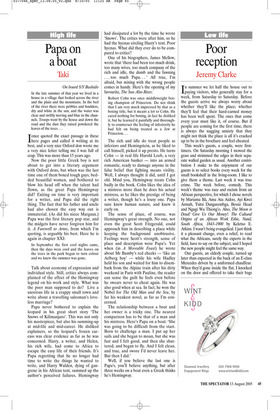Poor reception
Jeremy Clarke
In summer we let half the house out to paying visitors, who generally stay for a week, from Saturday to Saturday. Before the guests arrive we always worry about whether they’ll like the place; whether they’ll feel that their hard-earned money has been well spent. The ones that come every year must like it, of course. But if people are coming for the first time, there is always the nagging anxiety that they might not think the place is all it’s cracked up to be in the brochure and feel cheated.
This week’s guests, a couple, were firsttimers. On Saturday morning I mowed the grass and strimmed the edges in their separate walled garden as usual. Another contribution I make to the enjoyment of our guests is to select books every week for the small bookshelf in the living-room. I like to give them a theme. Last week it was true crime. The week before, comedy. This week’s theme was race and racism from an African perspective, for which I chose novels by Mariama Bâ, Ama Ata Aidoo, Ayi Kwei Armah, Tsitsi Dangarembga, Bessie Head and Ngugi Wa Thiong’o. Also, The Moon is Dead! Give Us Our Money!: The Cultural Origins of an African Work Ethic, Natal, South Africa, 1843–1900 by Keletso E. Atkins. I wasn’t being evangelical. I just think it a pleasant change, even a relief, to read what the Africans, surely the experts in the field, have to say on the subject, and I hoped the new people might feel the same way.
Our guests, an elderly couple, turned up later than expected in the back of an E-class Mercedes driven by a uniformed chauffeur. When they’d gone inside the flat, I knocked on the door and offered to take their bags upstairs. Joy and Reg they were called. The chauffeur wasn’t staying on, said Joy. He’d be back at the end of the week to pick them up. To get themselves around during their stay they were going to hire an MPV from the local garage. She’d be doing the driving. Reg’s emphysema was too bad for him to be doing any of that.
Reg was collapsed in a chair in the sittingroom, gasping horribly for breath. I introduced myself. He took my proffered hand but was too short of breath to speak or even make the obligatory up-and-down movement with his right hand. I’ve watched people die from emphysema before. Given a choice of dying from that or from lung cancer, I’d take the cancer. For a man in such a terrible condition, though, he was very well turned out: powder-blue double-breasted suit, pink tie, formal shoes shone to a glass finish. I lugged their heaviest bags upstairs. When I came back downstairs Reg was still unable to speak, but thanked me with a pathetically weary salute.
Next day, I was up a ladder at the front of the house, painting. I saw the door to the flat open and Reg come very slowly out and proceed across the drive towards the front door of our house — a distance of about ten yards. From my vantage point he looked and moved like an immaculately tailored three-toed sloth. A car was parked in the drive, fortunately, for he was able to cling to the rear of it until he’d found enough breath for the final assault. From door to door took him all told about six minutes, plus another minute to get his breath back and find the strength to lift the knocker.
No one came to the door, so I nipped down the ladder and presented myself. Reg was bent double and as yet too out of breath to speak. As I waited I wondered what Reg’s voice, when I finally heard it, would sound like. It was a rich Brummie. ‘Telly,’ he gasped. ‘Can’t get a decent picture.’ I went to have a look. Joy was in front of the telly, knitting. The cricket, which appeared to be taking place in a snowstorm, was on. Of course she’d have come to report the problem herself, she explained, but Reg sees it as his job to do any complaining that has to be done. I was very sorry about the picture, I said, but TV reception in this part of Devon is poor and there’s nothing anyone can do about it. Would they perhaps like to listen to the Light Programme on the radio until the picture improves? By now Reg had finally made it back to the flat and was propped against the doorway, fighting horribly for air. ‘Or what about a nice book, Reg?’ said Joy, leaning over to cast an increasingly doubtful eye over the titles I’d chosen. Then suddenly a little sad, she said, ‘I think perhaps we’ll just sit here quietly until the picture comes back again.’












































 Previous page
Previous page